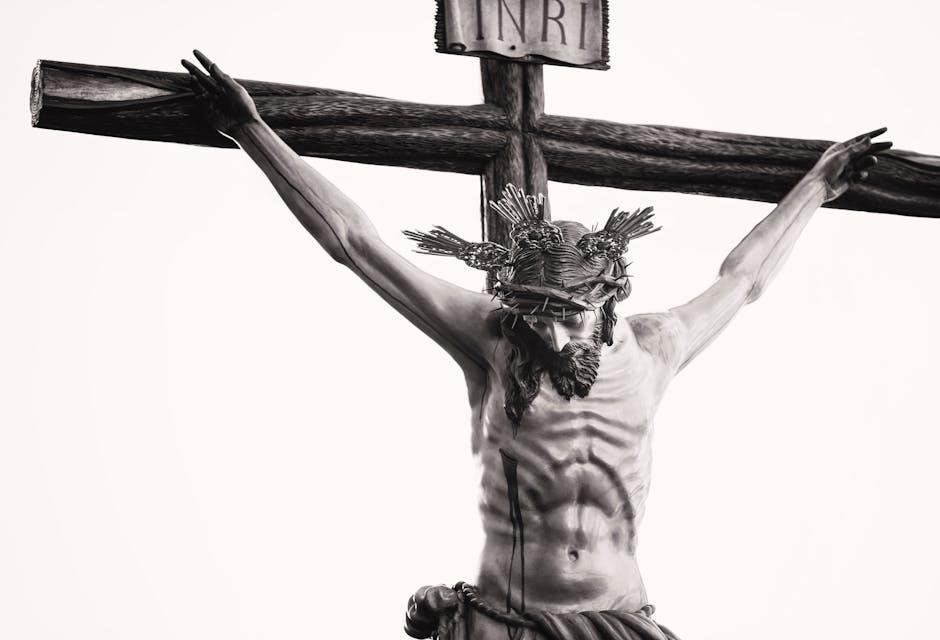The Book of the Wars of the Lord‚ referenced in Numbers 21:14‚ is an ancient text describing God’s victories over Israel’s enemies. Its contents‚ now lost‚ include poetic fragments preserved in the Torah.

Biblical Reference and Citations
The Book of the Wars of the Lord is explicitly mentioned in the Bible‚ specifically in Numbers 21:14‚ which states: “Therefore it is said in the Book of the Wars of the Lord: ‘…'” This verse serves as the only direct biblical reference to the text. The passage in Numbers 21:14-15 is believed to be an excerpt from this ancient book‚ describing the Israelites’ journey through Moab and their encounters with hostile populations. These poetic fragments are challenging to interpret but clearly reflect themes of divine intervention and triumph over enemies. The inclusion of this reference in the Torah suggests that the Book of the Wars of the Lord was a significant source for understanding Israel’s history and God’s role as a warrior. Despite its mention‚ the book itself has been lost to time‚ leaving only these brief citations to hint at its original content and purpose.

Historical Context and Background
The Book of the Wars of the Lord is rooted in ancient Israelite history‚ particularly during their wilderness wanderings. This period‚ lasting 40 years‚ was seen as a punishment for rebellion against Yahweh. The book‚ as mentioned in Numbers 21:14‚ likely served as a collection of poetic accounts celebrating divine victories. Its content spans an estimated 12‚000 years‚ chronicling cosmic conflicts with detailed descriptions of divine weaponry and ethereal armies. Scholars‚ such as Rashi‚ have interpreted its fragments‚ noting its non-canonical status. Despite its loss‚ references in scholarly works‚ like Richard C. Steiner’s article‚ highlight its historical significance. The book remains a mysterious yet vital text in understanding ancient Israel’s theological and historical narratives‚ even as its full contents remain elusive.

Content and Structure
The Book of the Wars of the Lord is described as an anthology of poetic accounts and songs celebrating God’s victories over Israel’s enemies. Its content spans an estimated 12‚000 years‚ detailing cosmic conflicts‚ divine weaponry‚ and ethereal armies. The book is structured into 27 chapters‚ each exploring different facets of God as a warrior‚ such as “The Warrior‚” “The Warrior King‚” and “The Peacemaker.” These chapters provide a chronological record of divine conflicts‚ blending poetic descriptions with historical narratives. While the complete text is lost‚ fragments like Numbers 21:14-15 offer glimpses into its style and themes. The book’s structure suggests a systematic approach to recounting divine triumphs‚ blending theology with history. Its poetic and narrative elements make it a unique blend of literature and religious commentary. Despite its non-canonical status‚ the book remains a significant‚ though elusive‚ source for understanding ancient Israelite theology and history.
Themes
The book explores themes of divine conflict‚ cosmic battles‚ and God’s role as a warrior. It highlights triumphs over enemies‚ showcasing divine weaponry and ethereal armies‚ emphasizing God’s providence and justice in Israel’s history.
The Concept of God as a Warrior
The Book of the Wars of the Lord prominently features the concept of God as a warrior‚ showcasing divine power and triumph over enemies. This theme is central to the text‚ with detailed descriptions of cosmic conflicts and ethereal armies. The book portrays God as both a warrior and a peacemaker‚ emphasizing divine providence and justice. Specific chapters‚ such as “The Warrior” and “The Warrior King‚” delve into these aspects‚ highlighting God’s role in protecting Israel and defeating adversaries. The text also explores the idea of divine weaponry and the machinations of primordial forces‚ reinforcing the imagery of God as an omnipotent being engaged in celestial and earthly battles. This portrayal underscores the theological significance of God’s active involvement in human history‚ particularly in the context of Israel’s struggles and victories. The concept of God as a warrior serves to inspire faith and reinforce the idea of divine sovereignty.
The Role of Divine Justice
The Book of the Wars of the Lord underscores the role of divine justice‚ portraying God as a righteous judge who upholds moral order. The text emphasizes God’s fairness in rewarding the faithful and punishing the wicked‚ often through military victories and defeats. Divine justice is woven into the narrative of Israel’s history‚ with battles serving as metaphors for moral judgment. The book highlights how God’s justice is both retributive and redemptive‚ aiming to restore balance and righteousness. This theme is particularly evident in the poetic fragments preserved in Numbers 21:14-15‚ which reflect on the Israelites’ journey and the consequences of their rebellion against God. The concept of divine justice in the Book of the Wars of the Lord serves as a theological framework for understanding God’s active involvement in human affairs‚ reinforcing the idea that divine actions are guided by a moral purpose.
Theological Significance
The Book of the Wars of the Lord holds profound theological significance as it portrays God as an active‚ sovereign ruler who intervenes in human history. The text emphasizes God’s power and justice‚ illustrating divine involvement in Israel’s battles and victories. It reinforces the concept of God as a warrior‚ highlighting His role in protecting the faithful and vanquishing enemies. The book also underscores the theme of divine deliverance‚ showcasing God’s faithfulness to His covenant people. Its theological framework provides insight into the nature of God’s justice‚ mercy‚ and sovereignty. Despite its non-canonical status‚ the Book of the Wars of the Lord remains a valuable resource for understanding the biblical narrative of redemption and divine intervention. Its loss has left a gap in theological discourse‚ yet its cited passages continue to inspire reflection on God’s active role in human affairs and the cosmic struggle between good and evil.
Non-Canonical Status
The Book of the Wars of the Lord is considered a non-canonical text‚ as it is not included in the Hebrew Bible or the Christian Old Testament. Despite its mention in Numbers 21:14‚ the book has been entirely lost to history‚ with only fragmented references remaining. These fragments suggest it was an anthology of poetic accounts celebrating divine victories over Israel’s enemies. The non-canonical status likely stems from its exclusion during the compilation of the Hebrew Bible‚ possibly due to its focus on military themes or its lack of alignment with the theological priorities of the time. While scholars speculate about its content‚ the absence of the full text leaves its exact nature unknown. Its non-canonical status‚ however‚ has not diminished its historical and theological intrigue‚ as it remains a subject of study and speculation among biblical scholars and enthusiasts alike.

Authorship and Attribution
The authorship of the Book of the Wars of the Lord remains unknown and speculative‚ as the text is now entirely lost. Its anonymity has led to various theories among scholars‚ with some suggesting it may have been compiled from earlier oral traditions or poetic sources. The book’s reference in Numbers 21:14 indicates it was composed before or during the Israelites’ wilderness wanderings‚ but no specific author is credited. Some hypothesize that it could have been written by a prophetic figure or a scribe documenting divine acts‚ while others propose it was a collective work compiled over time. The lack of concrete evidence makes attribution challenging‚ leaving its origins a subject of ongoing debate. Despite this‚ its historical and theological significance endures‚ particularly in its portrayal of God as a warrior‚ which has captivated scholars and religious thinkers for centuries.

Cultural and Religious Impact
The Book of the Wars of the Lord has left a profound cultural and religious impact‚ despite its loss. Its mention in the Bible and its depiction of God as a warrior have shaped theological discussions about divine justice and sovereignty. The book’s themes of cosmic conflicts and divine victories have influenced religious art‚ literature‚ and sermons‚ inspiring imagery of God as a protector and deliverer; Its poetic fragments‚ preserved in Numbers‚ have been interpreted and reinterpreted in various religious traditions‚ offering insights into ancient Israelite beliefs about God’s role in history. Additionally‚ the book’s mysterious nature has sparked curiosity and speculation‚ making it a subject of fascination in both scholarly and religious communities. Its influence can be seen in liturgical texts‚ hymns‚ and even modern religious writings that draw on its imagery of divine warfare. This enduring legacy underscores its significance as a foundational text in religious thought and cultural heritage.

Availability and Access as a PDF
The Book of the Wars of the Lord‚ though lost‚ is widely discussed in scholarly and religious circles. Its fragments‚ mentioned in Numbers 21:14‚ have been analyzed in various academic papers and theological texts. Modern interpretations and analyses of the book are available as PDF downloads‚ offering insights into its historical and religious significance. Users can access these documents through online repositories‚ academic journals‚ and religious websites. Additionally‚ guides on creating a Wars of the Lord PDF using software like Adobe Acrobat or Google Docs are readily available online. These resources provide detailed explanations of the book’s themes‚ such as divine warfare and justice‚ making it accessible to both scholars and general readers. Despite the original text being lost‚ its influence and interpretations remain accessible in digital formats‚ ensuring its legacy endures in contemporary discourse.
The Book of the Wars of the Lord remains a fascinating yet elusive text‚ referenced only in Numbers 21:14. Its fragments‚ preserved in the Torah‚ depict poetic accounts of divine victories‚ highlighting themes of God as a warrior and divine justice. Despite its non-canonical status and loss over time‚ the book’s influence endures through scholarly analyses and theological discussions. Modern resources‚ including PDFs of related studies and interpretations‚ provide accessible insights into its historical and religious significance. These materials explore its themes‚ such as cosmic conflicts and divine weaponry‚ offering a glimpse into its potential contents. While the original text is lost‚ its legacy continues to inspire inquiry and reflection‚ ensuring its place in religious and academic discourse.

No Responses